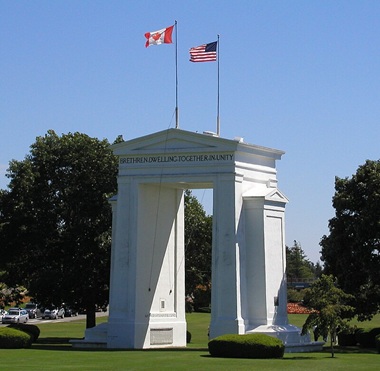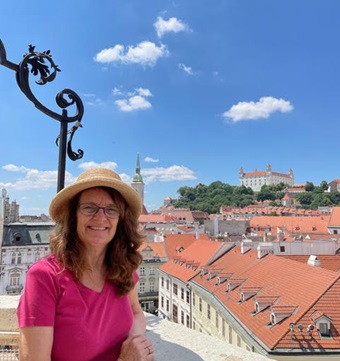
Peace Arch Border Crossings (https://en.wikipedia.org/wiki/Canada%E2%80%93United_States_border)
Twice this month I have cast votes in advance polls in Vancouver, both times because I anticipated being in the United States on election days. I am a dual American and Canadian citizen, and it was for the privilege of voting and because we’ve made our life here, that we became Canadians 10 years ago.
It’s a strange time to be a dual American and Canadian citizen. When we immigrated to Canada 23 years ago, we were welcomed by neighbours who lent us warm coats and invited us to a holiday party where we accidentally outed ourselves.
The conversation stopped when I said “trash” instead of garbage. All heads turned, and someone asked, “Are you American?” But when we answered, everyone nodded, and conversation resumed. There were a few awkward interactions for our kids in school – generally with parents and teachers, not with peers – but usually our being Americans was met with nonchalance.
I was pleased when at another holiday party the following year, our friends commented that I didn’t sound like an American – though my husband did. I felt rather smug until weeks later, back in California for Christmas, family members noted Steve sounded the same, but my cadence had changed. So much for feeling smug; now I was self-conscious.
In our family we like to think crossing cultures is something we do with some finesse. Leading cultural exchanges is part of our work. Observing cultural differences and exploring their meanings is fascinating. It’s also humbling, not something one ever masters, but we learn to be okay with dissonance.
“We are more patriotic than you are,” stated Tony, a Chinese student in our summer exchange. We North Americans were taken aback. In the session on politics, we had been sharing how our Canadian system works and offering observations and commentary. We had thought we were doing an excellent job describing political life in Canada; in fact, we were feeling rather proud and patriotic.
“You criticize your government, whereas we are patriotic and do not do so,” said Tony.
Mining differences and gaining better understanding of one another is why we were there, living together in university dorms in Xining, the capital of Qinghai province. We knew there was something to explore in Tony’s assertion. The magic of cultural exchange is that as we learn about other cultures, we learn more about our own too.
From that session an interesting conversation ensued: what does it mean to be patriotic? To Tony and his peers, to be patriotic meant not to criticize, but to trust and support the government, especially in the company of outsiders such as we were.
But for us in Canada, patriotism was less about loyalty to those in power and more about commitment to Canadian ideals; thus, patriotism requires that we hold our elected officials accountable to such values. When we sing our national anthem “O Canada . . . True patriot love in all of us command,” we envision “the True North strong and free” characterized by democratic values, and it is this ideal of Canada which commands our love; it is for this ideal “we stand on guard.” We expect elected leaders to uphold Canadian ideals, and we seek to oust leaders when they fail to do so.
At the time, though I helped lead the exchange, I, myself was not yet Canadian – I was a permanent resident in Canada. We had moved to Canada during the second Bush Administration when it behooved us to fly under the radar, so I quickly learned to say garbage instead of trash and pronounce the “o’s” in ‘process’ and ‘produce’ – opposite to what came naturally to me – while gradually learning the more subtle cultural differences.
When with our Chinese counterparts, we embarked on that deeper exploration of patriotism, it didn’t occur to me there would ever be conflict in expressing patriotism toward both Canada and the United States. In both cases, patriotism meant holding our leaders to similar ideals, and it was to express patriotism in this way, as a voter, that I decided to pursue dual citizenship.
Voting is to me a moving experience. A few years ago, my husband and I ran into several close neighbours at a polling station. We waited together to vote, laughing and sharing news. Our lawn signs would indicate we exactly cancelled out one another’s votes.
We all could have agreed to stay home. The results would have been the same as we had achieved by showing up – and yet to show up is the point. To vote is the point. To exercise the right to participate in choosing those whom we believe will best lead us toward the ideals we share, even though we differ, often profoundly, in how we believe those ideals will be best achieved.
Earlier this month my daughter and I stood in line for an hour to cast advance votes in Vancouver’s by-election. We would be in California for my niece’s wedding on April 5, election day in Vancouver, and a National Day of Action across the US.
Voter turn-out for advanced voting overwhelmed the polls and people waited longer to vote (or gave up) on election day. Although turn-out was merely 15 percent, that’s a 40 percent increase over the last by-election in 2017. Those who voted and even those who tried but gave up demonstrated the kind of patriotism we had explored on our cultural exchange in China, a commitment to common ideals and willingness to hold elected officials accountable to them.
The results were decisive. ABC’s website states, “Every single ABC candidate . . . was elected in the 2022 Vancouver civic election,” but in this by-election ABC’s candidates came in sixth and seventh behind all candidates endorsed by other parties. Campaign strategist Stephen Carter said, “We got our butts handed to us.”1
I had feared the mayor and city council might try to spin the election results – after all, the ruling party still holds a majority. But to their credit – and only time will tell if they deserve credit – Mayor Ken Sim acknowledged public dissatisfaction and the significance of such dissatisfaction. “We want to do better. We will do better. . . . We’re going to take a really hard look at how we present ourselves and what we do, and to be even more inclusive, and have those hard conversations.” 2
In the US, no such by-election is in sight. Midterm elections are more than 18 months away. People are turning to less conventional ways to express a kind of patriotism that seeks to hold elected leaders accountable, an effort made more difficult by the current administration’s flouting of convention, checks and balances, and even the rule of law.
At my niece’s wedding the officiant opened the ceremony with these words: “Today there are over 500,000 people at thousands of protests nationwide resisting harmful policies and practices and standing against hate. And here, on a beautiful hill in San Francisco, we are having our own resistance, as we celebrate the love of these two beautiful humans.”
Another who stood against hate, stood for precisely 25 hours and five minutes, is US Senator Cory Booker. On April 2 Booker broke the record for longest Senate floor speech, a record held for 68 years by segregationist Strom Thurmond who spoke at length attempting to block the Civil Rights Act of 1957.3
In his speech Senator Booker affirmed the patriotic possibility and necessity of holding leaders accountable: “The power of the people is always greater than the people in power. We must use our voice to demand a government that works for and by the people.”4 Over and over for more than a day, the senator read words penned or spoken by Americans on both sides of the political spectrum attempting to elevate voices of people affected by actions of the current president.
I long to be a citizen of a nation in which opportunities and rights are safeguarded for all, where together and individually we strive for the common good and the good of one another.
When preparing to take the oath of citizenship in Canada, we wrestled with whether as Americans we could affirm allegiance to Her Majesty Queen Elizabeth II of Canada, but we learned that in our constitutional monarchy Canada is personified by the monarch and for that reason we felt we could do so whole heartedly.
To be patriotic in either nation means to pursue democratic ideals of justice, liberty and opportunity. Sometimes we will stand up for the government and other times we will stand against it. Twice recently in Canada we stood in line to vote – to stand with or against the current government – and in San Francisco we stood in solidarity with others to celebrated a union and in solidarity with those standing against the current government’s actions.
Whether to vote, to protest, to defend or to represent, there are ideals worth standing for. It is to those, and not any person or party for which I stand. I want to live in and defend a country in which we can fiercely, but respectfully disagree as together we seek good for others as well as for ourselves.
Perhaps that desire and willingness to stand for it makes us citizens of something greater than any country whose flag we raise. Let’s discuss what we hold in common and where we differ, then let’s go vote.
1 https://vancouversun.com/news/abc-vancouver-pledges-learn-byelection-defeat
2 Ibid.
3 https://nationalpost.com/news/canada/senator-cory-booker-makes-a-record-setting-speech-with-a-nod-to-civil-rights
4 https://www.nbcnews.com/video/sen-booker-reminds-senate-of-the-power-of-the-people-236227653564

Susie Colby
Susie Colby has held many roles in InterVarsity Christian Fellowship in the United States and Canada. She grew up in California and has lived in Vancouver since 2003. With her late husband Steve, Susie raised three kids and a few pets here. Vancouver feels like home.
She has posted this comment on this site as a member of The Bell: Diverse Christian Voices in Vancouver. Go here to see earlier comments in the series.
